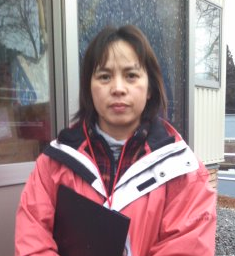Mari Miura is Filipina and lives in Minami Sanriku, a snowy coastal town famous for its oysters and seaweed in Miyagi-prefecture. The town of almost 18,000 people was hit by massive tsunami following the 9.0 powerful earthquake on the Japanese scale that hit the northern areas of Japan on March 11.
Mari escaped with her Japanese mother-in-law that fateful afternoon. They later were reunited with the family Her Japanese husband and father-in-law who were out at sea, survived miraculously. Their three children were safe in school. “It was a terrible disaster. I thought I would never see my husband and father-in-law who were swept away in their boat. People around me were telling me to be strong and look after the family if I was going to live alone. I prayed to God to save my family,” she recalled in an interview.
 Today, Mari lives in a temporary shelter in Togura-cho, that is located up the hill from the devastated coast line. The shelter, built by the government, houses herself, her children, husband and father and mother-in-law. The family lost their original home. But almost a year later life is slowly returning to normal. Her husband has started fishing again but the business has yet to return to its former sales. Therefore Mari whose main work was helping her husband to dry seaweed and also work in oyster cultivation, has now begun to work in recovery. Her job at the welfare section of the local Togura-cho office involves visiting seven local temporary homes. The staff is divided into groups who visit and spend time with the evacuees and also talking and listening to them. Most of the displaced people in the shelters are aged and live alone. Their lives are a stark differnce loosing their homes or family. “Our work is very important because we play the role of almost family. We make them laugh and give them support. They need this as they grapple with their difficult situations ,” she explained.
Today, Mari lives in a temporary shelter in Togura-cho, that is located up the hill from the devastated coast line. The shelter, built by the government, houses herself, her children, husband and father and mother-in-law. The family lost their original home. But almost a year later life is slowly returning to normal. Her husband has started fishing again but the business has yet to return to its former sales. Therefore Mari whose main work was helping her husband to dry seaweed and also work in oyster cultivation, has now begun to work in recovery. Her job at the welfare section of the local Togura-cho office involves visiting seven local temporary homes. The staff is divided into groups who visit and spend time with the evacuees and also talking and listening to them. Most of the displaced people in the shelters are aged and live alone. Their lives are a stark differnce loosing their homes or family. “Our work is very important because we play the role of almost family. We make them laugh and give them support. They need this as they grapple with their difficult situations ,” she explained.
Mari is from Luzon island in the Philippines. A devout Catholic, she looks forward to the weekly visits of priest who conducts Mass for the Christian population that includes other Filipina wives living in the area. With many women now looking for new jobs as a result of the devastation of the local fisheries industry, the new opening are in nursing or day care aimed specially the elderly population in Minami Sanriku. But Mari hopes fishing opportunities will make a quick return because this is the traditional livelihood of her husband. “My work in the fishing sector was tough –starting very early in the morning and working till late. But our income was stable and this is what is needed for the sake of our children. This is why I want the quick recovery of the fishing in Minami Sanriku,” she says.
Finally, she explained the most effective form of aid for disaster survivors in Minami Sanriku is helping the affected populations to meet each other so that maintain their community closeness. “ We are all need to help each other and be ale to live together. Having the space to maintain the traditional community togetherness while we wait for recovery is very important for successful disaster recovery,” she said.
Suvendrini Kakuchi
